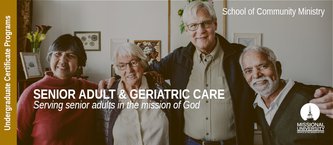
Why Senior Adult & Geriatric Care?
The Undergraduate Certificate in Senior Adult & Geriatric Care offers community ministry practitioners, community health educators, congregational and faith community nurses, pastoral care providers, senior adult pastors, healthcare missionaries, healthcare chaplains, Christian social workers, and those involved in serving senior adult persons and their families the following capabilities:
- ability to articulate a Trinitarian theological foundation of family
- ability to articulate the terminology, concepts, and scope of social, cultural and health topics of importance in any type of engagement of older persons
- ability to utilize case reports, definitions, and discussions and determine where and how ethics apply to various types of abuse common to the elderly
- ability to be effective caregivers to senior adults by understanding the physical and spiritual dimensions of theories of aging, stereotypes, lifespan aging, models of aging, and caregiving
- competency in providing support systems to the elderly and their families to maintain and enhance functioning and well-being
- ability to apply theories and strategies of aging and caregiving to create an assessment and elder care plan
- ability to apply elder care in the context of senior adult service agencies, geriatric servics or long-term care administration
- ability to apply the sociocultural aspects of aging, elder economics, or multicultural elder issues to elder care
Senior Adult Care classifies its levels of care under six different options for senior care services: Independent Living, Assisted Living, Memory Care, Skilled Nursing, Affordable Housing, and Short-Term Care. While each type has its own uniquenesses, each level of care is designed to address the physical, social, and spiritual issues facing senior adults. The Undergraduate Certificate in Senior Adult & Geriatric Care provides missional leaders with the background to address the physical, emotional, social as well as spiritual issues of this vulnerable population group in each of these levels of care.
